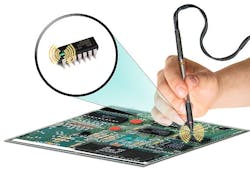SRI International joins Northrop and Draper to safeguard military from counterfeit electronics
ARLINGTON, Va., 16 Jan., 2015. SRI International in Menlo Park, Calif., is the third contractor selected for a U.S. military research program to develop new technologies to safeguard the U.S. military electronics supply chain from substandard used and counterfeit electronics.
Officials of the U.S. Defense Advanced Research projects Agency (DARPA) in Arlington, Va., announced a $6.8 million contract to SRI on Wednesday for the agency's Supply Chain Hardware Integrity for Electronics Defense (SHIELD) program.
SRI joins the Northrop Grumman Corp. Electronic Systems segment in Linthicum, Md., and the Charles Stark Draper Laboratory in Cambridge, Mass., on the DARPA SHIELD program to develop an advanced supply chain hardware authentication system and a capability that can detect counterfeit electronic components anywhere in the supply chain.
The three companies will develop a tool to verify the trustworthiness of protected electronic components without disrupting or harming the system into which they have been designed.
Northrop Grumman won a $12.3 million DARPA SHIELD contract Tuesday, and Draper Lab won a $4.1 million contract to Draper Lab for the SHIELD program earlier this month.
Used and counterfeit electronic components are widespread throughout the defense supply chain, DARPA officials say. Suspect electronic components present a critical risk in military systems where a malfunction of a single part could lead to system failures that can put warfighter lives and missions at risk.
Related: Northrop Grumman joins Draper Lab in program to combat military counterfeit electronics
DARPA researchers are asking the three companies to develop a 100-by-100-micron component, or dielet, that authenticates electronics components. The Draper-designed dielets will have encryption engines, sensors to detect tampering, and that affix to today’s electronic components such as microchips.
The SHIELD program's goal is to provide 100 percent assurance against recycled components that are sold as new; unlicensed overproduction of authorized components; test rejects and sub-standard components sold as high-quality; parts marked with falsely elevated reliability or newer date of manufacture; low-quality clones and copies that may include hidden functionality; and components that are covertly repackaged for unauthorized applications, DARPA officials say.
"SHIELD demands a tool that costs less than a penny per unit, yet makes counterfeiting too expensive and technically difficult to do,” says Kerry Bernstein, the SHIELD program manager at DARPA.
"The dielet will be designed to be robust in operation, yet fragile in the face of tampering," Bernstein says. "What SHIELD is seeking is a very advanced piece of hardware that will offer an on-demand authentication method never before available to the supply chain."
Related: Draper Lab takes aim at military counterfeit electronics in work on DARPA SHIELD program
the three companies will develop a dielet that can be inserted into the electronic component’s package at the manufacturing site or affixed to existing trusted components, without any alteration of the host component’s design or reliability.
the three companies will design dielets with no electrical connections to the host component, such that authenticity testing can be done anywhere with a handheld or automated probes. After a scan, an inexpensive appliance like a smart phone will upload a serial number to a central, industry-owned server. The server sends an unencrypted challenge to the dielet, which sends back an encrypted answer and data from passive sensors—like light exposure—that could indicate tampering.
SRI International will do the work in Menlo Park, Calif.; Portland, Ore.,; San Diego; and Santa Clara, Calif., and should be finished by July 2016.
For more information contact SRI International online at www.sri.com, Northrop Grumman Electronic Systems online at www.northropgrumman.com, the Charles Stark Draper Laboratory online at www.draper.com, or DARPA at www.darpa.mil.

John Keller | Editor
John Keller is editor-in-chief of Military & Aerospace Electronics magazine, which provides extensive coverage and analysis of enabling electronic and optoelectronic technologies in military, space, and commercial aviation applications. A member of the Military & Aerospace Electronics staff since the magazine's founding in 1989, Mr. Keller took over as chief editor in 1995.

